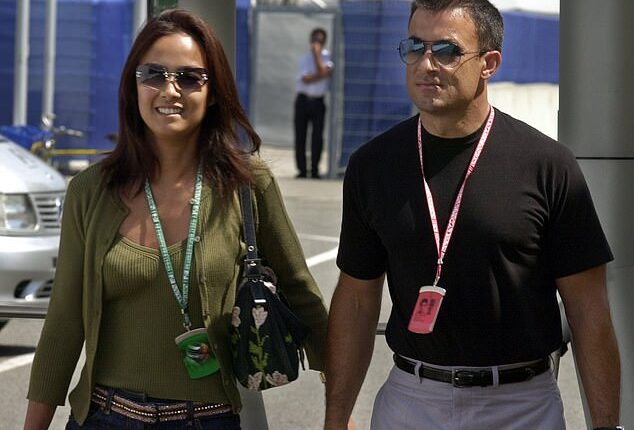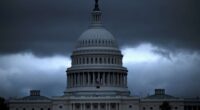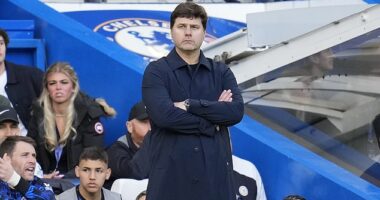The sprawling altercation I had with Tyson Fury in 2015 was probably the most high-profile row I have had with a sportsman.
But there have been others. Arguments have always been part of the back and forth of sports journalism and even if they are less common now – because personal interactions are becoming less common and more barriers are being placed between sports stars and journalists – they often lead to better understanding.
From shouting matches in the mixed zone at Wembley to being told off in Bernie Ecclestone’s bus, here are some of the biggest bust-ups I’ve been a part of…
1. Jean Alesi
In the 1990s, when I was a reporter on the Formula One circuit, Jean Alesi was known as the most hot-tempered of grand prix drivers. He was a charming man but he did not suffer fools gladly. Which, on this occasion, is where I came in.
Alesi, who drove for Ferrari at the time, had started dating a famous Japanese actress called Kumiko Goto and in the build-up to the Monaco Grand Prix in 1994, three separate sources, including a respected Japanese journalist, had told me she had been banned from the team garage because she was seen as a distraction.
I wrote the story and it appeared on the day before the race. It was given a prominent display in the paper. That Saturday morning, I walked down the pitlane with a friend and colleague and, as we passed the Ferrari garage, there was Kumiko, as large as life, smiling and happy with the rest of the team.

French racing driver Jean Alesi with his wife Kuniko Goto. He took exception, rightly, to an erroneous story I had written about the pair

Alesi was the most hot-tempered of drivers. He was a charming man but he did not suffer fools gladly. Which, on this occasion, is where I came in

Alesi pinned me against the wall and told me he had been waiting for this moment for years
My friend saw the horror-stricken expression on my face and doubled up with laughter. It was a while before he recovered himself. I kept walking.
I gave Alesi a wide berth for a long time after that. Like a coward, I avoided him for a couple of years. And then, when he had moved to Benetton, I was offered an interview with him during testing at Silverstone.
I figured that, by that time, he had probably forgotten about my erroneous story in Monaco. He and Kumiko were married by then. They’re still married and they now have three children. We did the interview and he was professional and courteous, even friendly. I was relieved.
But as I was getting ready to go and the public relations people had drifted away, he appeared next to me and pinned me up against the wall. He told me he had been waiting for this moment for years.
He got right in my face. He looked like he was ready to lose it. He told me I had no idea how much trouble that story about his girlfriend had caused him. And her. She was a star in her own right and it had provoked a feeding frenzy in Japan that she had had to fend off.
I apologised to him, of course, which I should have done a long time earlier. He accepted the apology and walked away.
2. Rio Ferdinand
I don’t want to spoil this before I’ve even started but I’ve always been a fan of Rio Ferdinand, both as a player and a person. And I still am. He was a fine analyst for BT Sport and now he’s doing agenda-setting interviews of his own.
However, there was a brief hiatus in our cordial relationship over him missing a drugs test in 2003.

Rio Ferdinand and I were involved in a shouting match in the mixed zone after an England game

Our cordial relationship was put on hold for… about eight years
When I say ‘brief’, it was probably about eight years and in 2011, he lost patience when I made a mention of it and sent me a direct message on Twitter that began with the salutation ‘You fat prick…’
I wrote about it, which angered Rio further because he felt a direct message should be a confidential communication. He said that if I had something to say to him, I should have said it to his face.
So after the next England game, against Switzerland at Wembley, I spoke to him in the mixed zone and it turned into a shouting match.
Not my finest hour but back then, it was more usual and, I think, more healthy, for journalists and players to be able to exchange views. And it provided a decent couple of minutes of entertainment for my colleagues.
3. Sir Alex Ferguson
When Manchester United arrived in Lisbon to play Benfica in the Stadium of Light in December 2005, they were enduring a rare fallow period under the management of Sir Alex Ferguson. They needed to beat Benfica in the final group game just to progress to the knockout stages of the Champions League.
The pre-match press conference, the day before the game, was in a cavernous conference hall in the Portuguese capital and, from the safety of a seat near the back, I got the microphone and asked Sir Alex if he was worried his job would be in danger if United lost.

I asked Sir Alex Ferguson if he was worried his job would be in danger if United lost…

He took exception to the question and used some colourful language to describe what he thought of me

Ferguson was no stranger to run-ins with members of the press
‘Next question,’ Ferguson said. I asked the same question again. ‘Next question,’ Sir Alex said again, a little more fiercely this time. The compere moved on and Ferguson muttered something to his assistant Carlos Queiroz, who was sitting beside him on the dais.
Afterwards, some of the television guys came up and said their microphones had picked up what Fergie said to Queiroz after my questions.
They were smiling broadly. They were keen to tell me. ‘We’ve got some right f***ing p****s in here today,’ Sir Alex had said.
There was no coming back from that, really, although it was positively tame compared to some of the exchanges he had with my colleagues who worked the Manchester beat.
4. Max Mosley
The 1994 season was a tumultuous year in Formula One. Roland Ratzenberger and Ayrton Senna were killed at the San Marino Grand Prix at Imola and Karl Wendlinger had sustained serious injuries at the following race in Monaco.
Before the next race in Barcelona, the FIA president Max Mosley sought to introduce sweeping changes to improve safety and some of the teams rebelled against him. My report bastardised a line from The Clash. ‘The teams fought the law and the teams won,’ I wrote.
I went out that night and was feeling rather fragile when I arrived at the circuit the next morning. I’d only been at my desk for a couple of minutes when the FIA press delegate marched over and said: ‘Bernie wants to see you in his bus.’
I’d only been doing the job for a year at that stage. Bernie Ecclestone had a fearsome reputation as a man who ruled by fear. My hangover suddenly started to feel a lot worse.
Bernie operated out of a grey bus with blacked out windows that was always parked in a prominent position in the paddock and stories were legion of the terrible dressing-downs that those who crossed him were subjected to in that bus.

Max Mosley (centre) and Bernie Ecclestone (right) talk to ATS team principal Guenther Schmid in 1980. F1 supremo Ecclestone had a fearsome reputation as a man who ruled by fear

Mosley had a forensically sharp mind. He outlined to me in ferociously cold detail quite how fundamentally my piece was flawed
I’d never met him at that point. Nor had I ever spoken to Mosley. I went down to Bernie’s bus and knocked on the door. He opened it. I introduced myself. He was angry. ‘What’s this shit you’ve written in your paper?’ he said.
I managed to force out a halting explanation. But Bernie wasn’t really listening. He thrust a telephone receiver into my hand. ‘Anyway,’ he said, ‘I’ve got Max on the phone. He’s very angry with you. You better explain it to him.’
Things didn’t get much better. Mosley had a forensically sharp mind. He outlined to me in ferociously cold detail quite how fundamentally my piece was flawed, how appalled he was, how he would be talking to people at the top of the paper who were friends of his and how I was now on very thin ice with him and the F1 authorities.
When he finished, I must have looked several shades paler than I had when I got into that bus. I handed the phone back to Bernie, who was grinning broadly by this point. ‘You’ll be all right, sport,’ he said. It turned out it was the beginning of a beautiful friendship.









